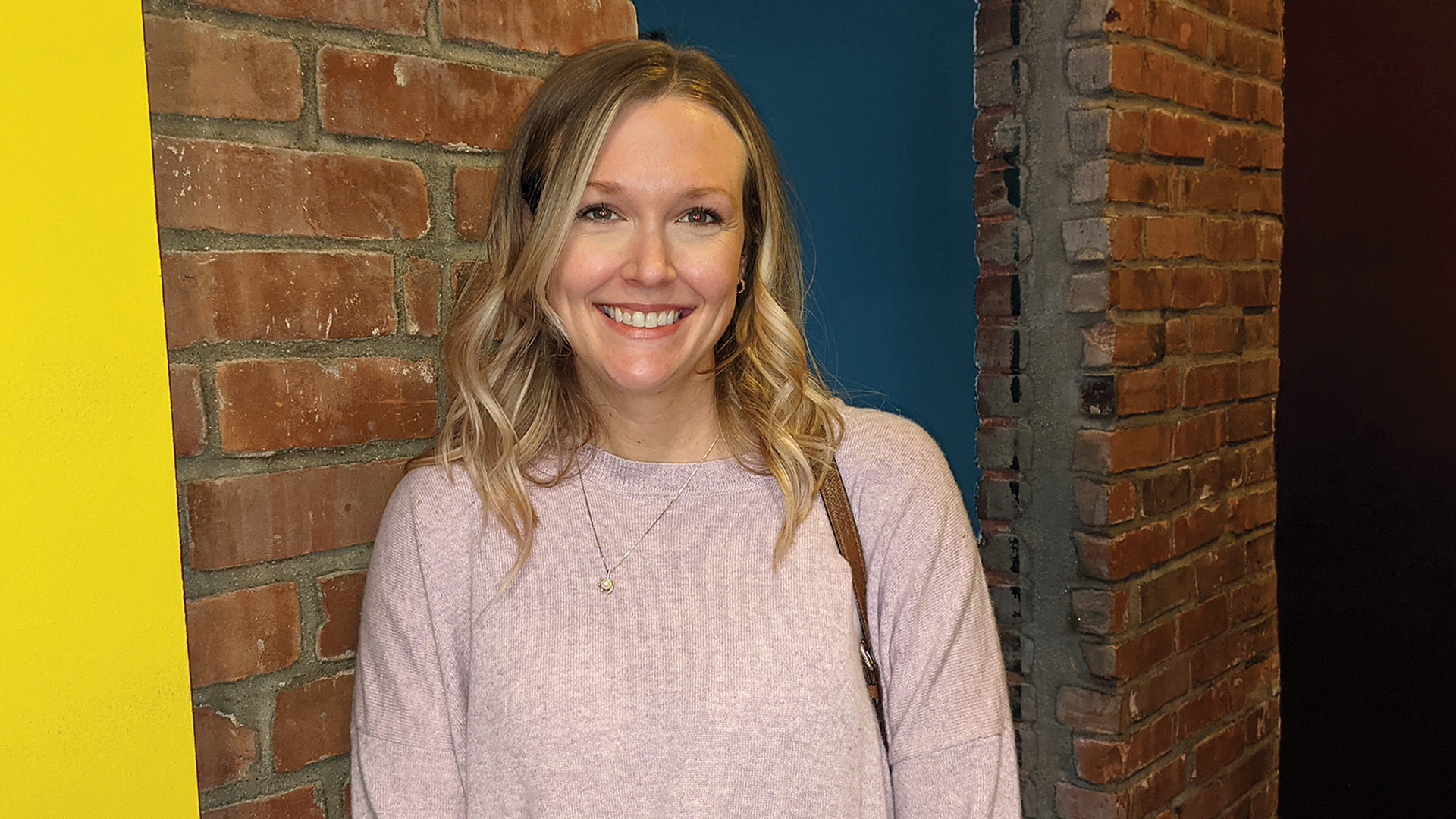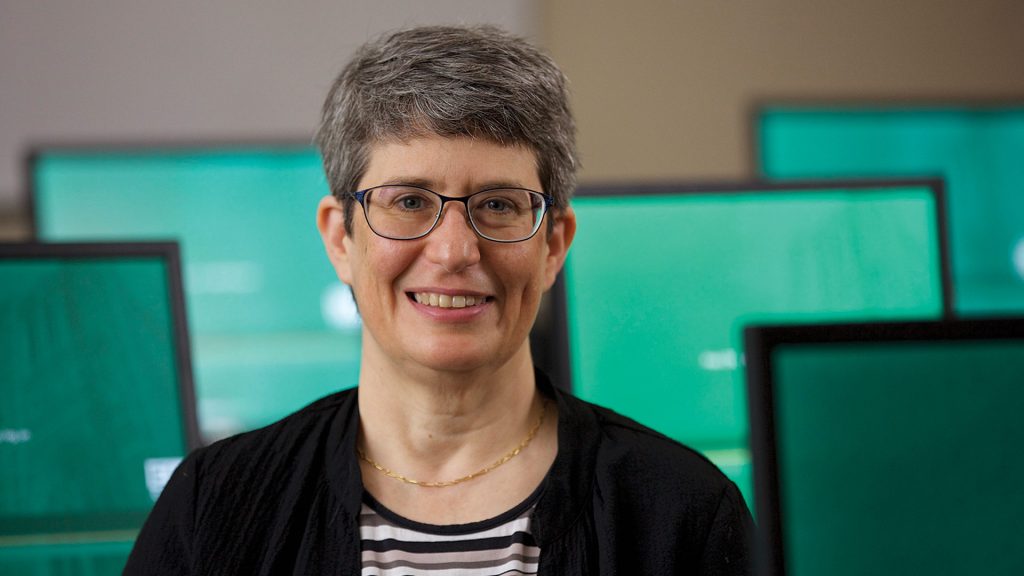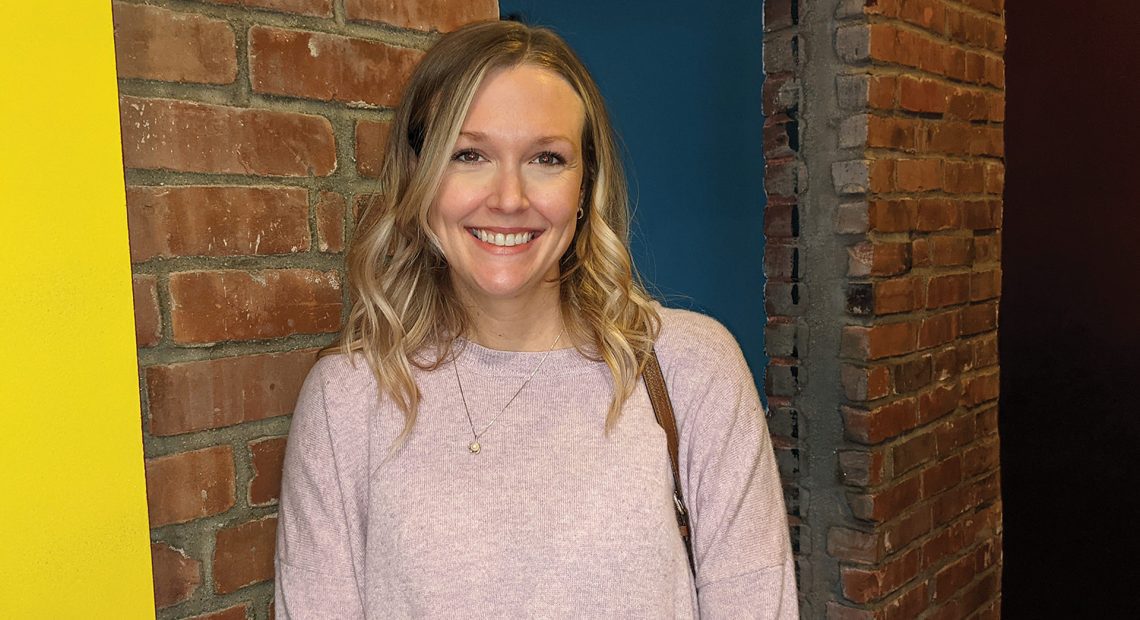Missed Connections
It’s a widely quoted statistic that, unfortunately, hasn’t changed much in recent years — only about one-quarter of information-technology (IT) jobs are held by women, and the percentages are much less for women of color — and women in IT leadership, for that matter. That will change, those working and teaching in the field say — but only with a stronger emphasis on making not only women aware of the wide array of careers available in IT, but girls as well.

Hilary LeBrun says stereotypes have obscured what a rich, varied field IT is — and kept many women from exploring it.
As an associate professor of Computer Science at Elms College, Beryl Hoffman is somewhat far afield of her first chosen college major: biology.
“I had not really heard about computer science as a career at all — my high school didn’t offer it,” she told BusinessWest. “But a friend talked me into taking a coding class for fun.”
And she enjoyed it — enough to eventually push her studies in a different direction.
“As soon as I started it, I felt that, if girls had that experience early on, they would also really enjoy it,” Hoffman recalled. “What hooked me was the problem-solving aspect, plus the creativity. A lot of girls don’t get introduced to that, even after school or at home, where it’s boys gaming and building robots. Girls don’t get to experience that as much.”
That reality has no doubt contributed to a wide gender disparity in the IT world. According to data from the National Center for Women & Information Technology, women make up 47% of all employed adults in the U.S., but hold only 25% of computing roles. It’s more dire for minority women; of the 25% of women working in technology, Asian women make up just 5% of that number, while black and Hispanic women account for 3% and 1%, respectively.
“What hooked me was the problem-solving aspect, plus the creativity. A lot of girls don’t get introduced to that, even after school or at home, where it’s boys gaming and building robots.”
“It’s mostly societal expectations and stereotypes,” Hoffman said. “I do believe we need to start introducing people, especially young girls, to computer science and technology when they’re young. That’s happening more and more — I’m seeing more computer science even in elementary schools. It will change; it’s just slow. But I have been seeing slight improvements every year.”
Hilary LeBrun didn’t start out in computer science, and she certainly never thought she’d eventually be COO of Paragus IT when she was working in the hotel industry.
“I was up for a change — I wanted to work in a more family-friendly industry, and the hotel industry isn’t family-friendly. I also wanted to work for a growing company with a good culture that was doing something important. And I found it in Paragus.”
She started as an assistant to CEO Delcie Bean and was quickly excited about how the company helps other businesses — keeping networks secure, creating efficiencies, finding budget-friendly solutions for clients, and the like. She sees the wide variety of work available in IT, and the relationship-centered focus of much of it, and has thought about why more women aren’t plugging in to these careers.

Beryl Hoffman says one key to closing the gender gap in IT is introducing girls to computers at much earlier ages.
“Part of it is the stereotype,” LeBrun said, echoing Hoffman’s thoughts. “It’s always been this predominantly male industry, and it’s something that’s taken women a little while to get into. There’s almost a stigma around it, that it’s this geeky industry, it’s the gamers that get into it, but people aren’t seeing there’s so much more to it.”
For instance, “it can attract somebody who wants to solve problems, and also create efficiencies, even someone who wants to go into management — there are just so many different aspects. There’s a lack of awareness around that, and the ways that women — and even men — can learn and get that education, get that foot in the door.”
“It’s always been this predominantly male industry, and it’s something that’s taken women a little while to get into. There’s almost a stigma around it, that it’s this geeky industry, it’s the gamers that get into it, but people aren’t seeing there’s so much more to it.”
Zoe Alfano got her foot in the door as a college student at UConn, where she had her eyes on an engineering degree but began working in campus tech support and realized she was good at solving problems. With four years of that work experience in hand, she was hired by Paragus as a client support engineer. She cited a couple of reasons why women don’t follow a similar path.
“It depends a lot on the person, their experience. They might not have been exposed, or didn’t have someone in their lives say, ‘try it out, you might be good at it.’ Or, some people just don’t consider themselves technical; they think they’re not good at it. But they might be good at problem-solving, and solving a problem with a piece of technology isn’t a whole lot different than figuring out what’s wrong with the stove when it’s not working, or solving a math problem. Some people might be better than they anticipate, but don’t have the opportunity to try.”
Constant Change
When they do try, Alfano said, they find that it’s a field that’s constantly evolving, with always something new to learn.
“There’s such a wealth of knowledge, it’s impossible to be a jack of all trades, with so many things to specialize in. A network manager can prevent attacks. A technician like me is good at solving day-to-day issues but might not be as good at solving network-related issues. There are so many different things to know about and learn, and you always have an opportunity to learn something new and choose where want to go.”
Zoe Alfano
“Solving a problem with a piece of technology isn’t a whole lot different than figuring out what’s wrong with the stove when it’s not working, or solving a math problem.”
That can be appealing for women who love learning and working collaboratively, she added — and, often, helping people.
“You’re able to say, ‘hey, I can help with your issue,’ and if you value getting a positive response from someone, that’s a big reason to stick with the field. You talk on the phone, and they’re so grateful their problem isn’t happening anymore. It just makes you feel good.”
LeBrun finds a gratifying challenge in how quickly IT changes.
“Even just the technology we support — 10 years ago, every company had a server. Now servers are dying; everyone’s going to the cloud,” she noted. “So we always need to adapt, always need to change, and that’s one of the aspects I love about it. The industry is not stagnant. There’s always something to learn, new technology to adapt and bring to our clients.”
Beverly Benson, IT and Security program director at Bay Path University, first became interested in the field when her own information was compromised. The more she learned about cybersecurity, the more she related it to the non-technical things people do every day to keep safe, from locking doors to watching over their kids. In short, she saw an appealing human element to a technical field.
“We do that as mothers naturally, always trying to protect our children, always checking in and protecting. I just get paid to do it,” she said. “I think it comes naturally as a woman; we’re the nurturers in a positive sense, a protective sense.”
She agreed with the others BusinessWest spoke with that more awareness of the breadth of IT careers, from the highly technical side to the more relationship-driven side, would boost the number of women interested in pursuing it. “There are a variety of careers within the field — they need to know it’s much more than coding,” she noted.
“There is a need to protect information and infrastructure in every sector,” Benson went on. “It has the potential to impact the food you eat, the vehicles that you drive, it can impact healthcare and your medical records … everyone is now living in such a connected world that there is a need to protect every aspect of our lives.”
Hoffman agreed. “It’s a really awesome field of high-growth, high-paying jobs,” she said. “Also, technology is essential in any field now. A lot of folks are missing out on the opportunities out there. And I think a lot of it starts with education. We need to let people know about these careers and have girls experience them.”
To that end, Hoffman is part of a nonprofit, Holyoke Codes, that aims to bring coding and robotics to kids in Holyoke. She also received grant to build a high-school curriculum called CSAwesome, a free e-book that teaches AP CS A and Java and is becoming more widely used in high schools.
“That’s great to see, too,” she said. “And the AP College Board has done a lot to try to get girls to take AP classes in computer science. It’s nice to see as we try to grow that pipeline, and see it broaden and become more diverse.”
Beverly Benson
“Everyone is now living in such a connected world that there is a need to protect every aspect of our lives.”
The education needs to start earlier than high school, though. “They say that most kids start thinking about careers in middle school. So we need to start educating them there,” Hoffman said, adding that girls need to see more female role models from the IT world.
“As more women go into IT, they will encourage even more women to go into IT. But it’s just slow. We should start them young — even at home, often the robotics and the computers are bought for the boys, not the girls.”
Disparities linger in school districts as well, she said, noting that suburban schools are more likely to present robust computer-science programs than urban and rural schools.
That’s a lot of factors in play, she told BusinessWest, “but it’s slowly changing.”
Serve and Protect
LeBrun admits IT can be an intimidating field for women, considering the gender disparity and stereotypes, and is glad she found a company in Paragus that employs — and promotes — plenty of women. She hopes others will find similarly supportive cultures.
But she also believes women need to consider how important IT is to the work world as a whole and how gratifying it can be to be a part of that.
“COVID really opened up businesses’ eyes to how important their IT is and how much they depend on it,” she said. “We try to tell our clients, ‘picking your IT firm should be as important a decision as picking your lawyer or accountant.’ We’re a partner. We’re working to protect their business.
“And I think that’s really exciting,” she added, “to be in an industry that can protect other companies so much — it just creates so many opportunities. Again, it’s about bringing that awareness to girls in school who are still trying to figure it out.”
For older women and career changers, Tech Foundry, a workforce training program affiliated with Paragus, is one example of how to create opportunity — “to just make it doable for them, because it can be scary,” LeBrun said. “There’s a lot to learn in the field.”
“A lot of people don’t realize the stereotype of a nerd in his basement, coding away, it’s not like that anymore. It takes a team to create software.”
IT companies would do well, she added, to seek employees who might not have every technical skill, but brings fresh perspectives to an organization. “They might not have the traditional background, but have the drive and personality, and the rest can be taught.”
The collaborative nature of much IT work is appealing as well, Hoffman said. “A lot of people don’t realize the stereotype of a nerd in his basement, coding away, it’s not like that anymore. It takes a team to create software.”
The IT industry is also becoming integrated into other careers, she added, from healthcare to finance. “More and more, all fields are integrating IT, so no matter what you do, those skills are going to be useful in the future, especially in Massachusetts, with so much growth in biotechnology and health sciences.”
The ability to work remotely is another plus — for many firms, a fairly recent one, Benson said.
“Because we had no other choice, we had to work remotely during the pandemic. That has opened doors of possibilities for all people, including women. You don’t have to uproot your family to move to a state heavily populated by cybersecurity opportunities. Now some organizations are OK with you working remotely.”
In short, opportunity abounds. Hopefully, the women we spoke with said, awareness will follow — and stereotypes will continue to crumble.
“I try to encourage women to give it a try,” Benson said. “My mantra is ‘dare to dream.’ I want to see more women in this field. We need them.”
Joseph Bednar can be reached at [email protected]








